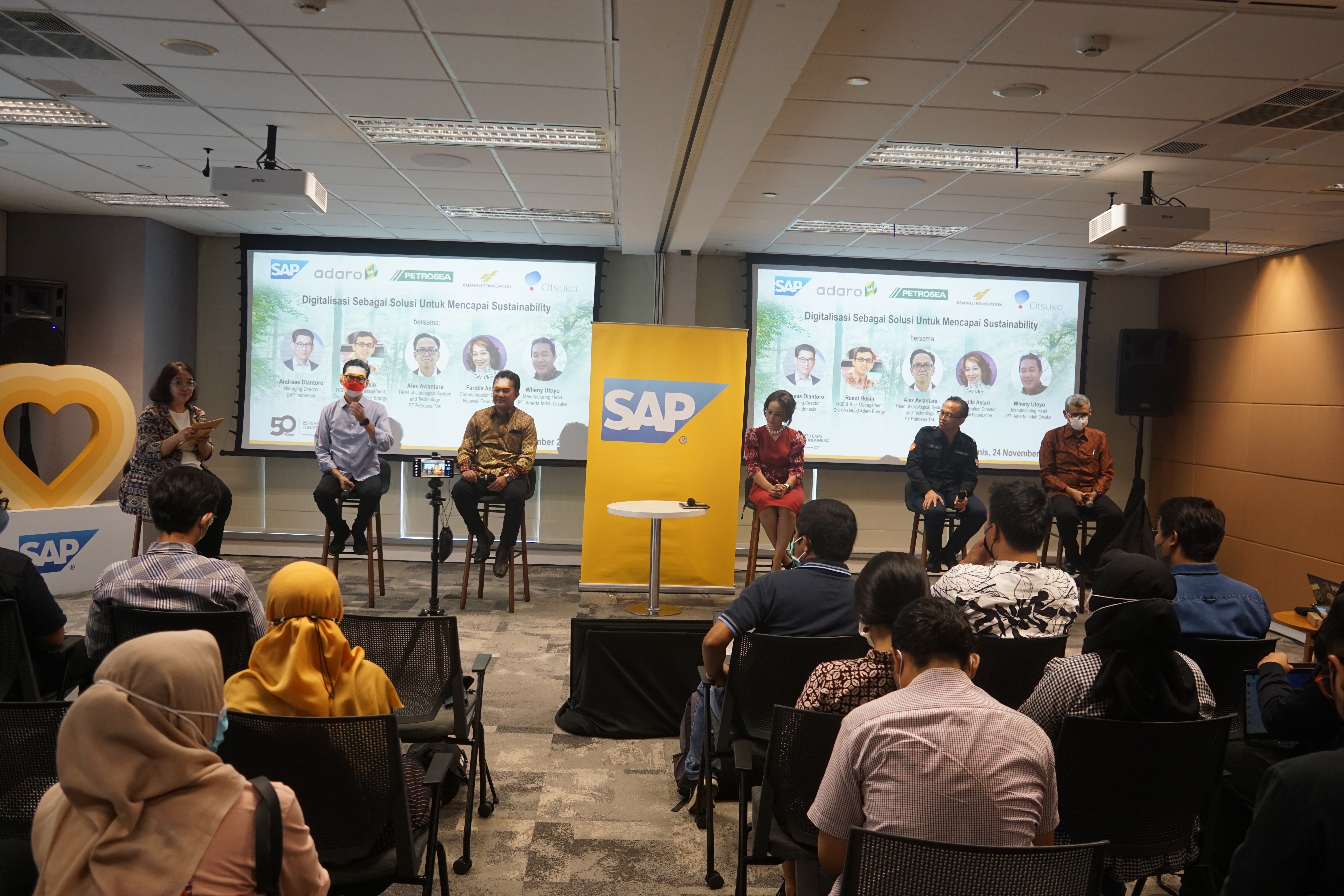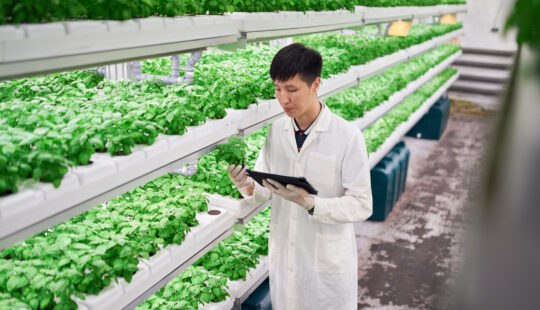JAKARTA — As discussions grow on the impact of climate change on the quality of the world’s environment, sustainability has become an issue that is increasingly becoming prevalent. Not only related to the environment, but sustainability also includes equality, as stated in the Sustainable Development Goals (SDGs). Sustainability is closely related to the Three Zeros mission, namely zero emission, zero waste, and zero inequality. This highly relevant topic has resulted in several recommendations at the recent G20 Summit in Bali.
A recent research conducted by SAP and Oxford Economics found that the main driver and challenge for implementing sustainability is compliance with regulatory mandates. The study also shows that investing in data is key to improving sustainability outcomes. For this reason, SAP Indonesia as a business process solution provider company is committed to supporting the implementation of sustainability programs in Indonesia in the company’s business processes by prioritizing the role of data and digitalization.
Speaking at the Media Roundtable: Digitalization as a Solution to Achieve Sustainability (24/11), Andreas Diantoro, Managing Director of SAP Indonesia revealed that according to the study, around 46% of the business sector in Indonesia already has a mature sustainability plan. “Of course, this is a good thing and we believe this number may continue to grow significantly with the establishment of partnerships with external parties,” said Andreas Diantoro.
Furthermore, Andreas explained how sustainability plans can be implemented and executed without gaps. One of the factors for a successful implementation of a sustainability plan is accurate data management to help companies achieve their sustainability goals.
“One of the problems lie in the accuracy of the data that each company has. If the data collection process goes smoothly, data miscalculation is avoided and sustainability plans can be efficiently implemented to achieve these goals and plans,” explained Andreas.
PT Adaro Energy Indonesia Tbk (IDX: ADRO), one of SAP’s customers, is a company engaged in the mining and energy sector. In its efforts to implement sustainability, Adaro Energy plans to develop sustainability programs and conduct environmental management programs through structured and systematic efforts to reduce and manage carbon emissions. Annual performance reports related to the sustainability program conducted by Adaro Energy can be accessed publicly on Adaro Energy’s website.
Rusdi Husin, HSE & Risk Management Division Head of Adaro Energy explained that the implementation of the sustainability program at Adaro received a lot of help and support from internal and external parties to ensure that the program runs effectively. “The sustainability programs that have been implemented by Adaro Energy will continue to be carried out, not only to carry out obligations but also to continue to preserve the environment and support the SDGs program, as well as to comply with the elements contained in the ESG,” explained Rusdi.
In addition, PT Petrosea Tbk (IDX: PTRO), a multi-disciplinary mining and engineering & construction services company with a footprint of more than 50 years, also believes that SAP services are able to help in carrying out sustainability actions with digitalization. This was conveyed by Alexander Aviantara, Head of Geological System and Technology PT Petrosea Tbk, “Petrosea has used technology 4.0 such as the Internet of Things (IoT), data science and analytics, and smart sensors in the company’s operations. Digitalization, for example, is applied to predictive maintenance for trucks and heavy equipment to increase component life and overcome fuel consumption that is detected to be high or above average. This initiative helps reduce energy use and prevent wastage,” said Alexander.
In implementing it, Petrosea certainly faced several challenges in the early stages because human resources in the field needed the training to use this technology. However, this problem can be overcome with continuous training conducted to increase HR skills as well as a continuous improvement process.
“Digital transformation has really helped us at Petrosea to support and implement our sustainability strategy. Every challenge we face is a part of a mission that must be completed in an appropriate and effective way. We are proud because our efforts have received recognition at the Asia Pacific level by The International Data Corporation (IDC) for the Special Award for Sustainability category, last October,” said Alexander.
In line with this, PT Amerta Indah Otsuka, a nutritional and pharmaceutical manufacturing company, also believes in SAP Indonesia’s solutions to encourage sustainability efforts in its business processes. Wheny Utoyo, Manufacturing Head Factory of PT Amerta Indah Otsuka, believes that digitalization helps reduce emissions and save energy. “At AIO we combine experience, expertise, and innovation to build processes for reducing emissions and saving energy. The involvement of various related parties and digitalization in AIO are the main keys to the success of our process of reducing emissions and saving energy,” said Wheny.
Observing the phenomenon of sustainability practices, Fardila Astari Rachmiliza, Communication Director of the Rajawali Foundation, a philanthropic non-profit organization, explained that implementing accountable sustainability is becoming increasingly important. “Such as the SINERGI (Strengthening Coordinator for Inclusive Workforce Development in Indonesia) project, a project funded by UNSAID (through the MITRA KUNCI program) and in partnership with the office of Governor of Central Java Province, encouraging inclusive employment that is more friendly and massively able to reach hundreds of thousands of young people, underprivileged and vulnerable (including disable youth and productive women) in the age range of 18-34 years and have an income of less than $2 per day,” said Fardila.
“With the availability of clear and precise sustainability measurement data, the impact resulting from the project will be measured and we can carry out monitoring in order to minimize the negative impacts that may occur,” explained Fardila.
Sustainability practices are a journey. According to Fardila, the application of sustainability in a company must continue to be improved in terms of quality. This is important to do so that the resulting impact can be valuable and meaningful for all beneficiaries and all Indonesian people in the future.
The fact that digital transformation plays a large role encourages SAP Indonesia to emphasize its commitment to assisting sustainable business innovation by using digital technology developments through effective data processing in a fast and precise manner.
“We believe this commitment certainly needs to be implemented in collaboration with related parties so that it may achieve a greater impact and also to be able to build a more sustainable business model. This collaboration can be a new opportunity for companies to develop plans that are more mature and beneficial for the company and the wider community,” concluded Andreas Diantoro.
Optimalisasi Peran Data dan Digitalisasi untuk Mencapai Sustainability
Jakarta, 12 Desember 2022 – Seiring berkembangnya bahasan tentang dampak perubahan iklim pada kualitas lingkungan hidup di dunia, sustainability menjadi isu yang semakin ramai dibicarakan dan diterapkan di berbagai aspek. Tidak hanya terkait lingkungan hidup, sustainability juga mencakup employment dan decent work for all, seperti yang tercantum dalam Sustainable Development Goals (SDGs). Sustainability berkaitan erat dengan misi three zeros, yakni zero emission (nol emisi), zero waste (nol limbah), dan zero inequality (nol ketidaksetaraan). Topik ini juga menjadi isu yang hangat dibicarakan dan menghasilkan beberapa rekomendasi pada KTT G20 di Bali, pekan lalu.
Riset yang dilakukan SAP dan Oxford Economics menemukan pendorong sekaligus tantangan utama penerapan sustainability adalah kepatuhan terhadap mandat regulasi. Riset itu juga menunjukkan bahwa investasi pada data menjadi kunci meningkatkan hasil keberlanjutan. Untuk itu, SAP Indonesia (NYSE: SAP) sebagai perusahaan penyedia solusi proses bisnis, berkomitmen mendukung penerapan program sustainability di Indonesia dalam proses bisnis perusahaan dengan mengedepankan peran data dan digitalisasi.
Dalam kesempatan berbincang dengan awak media, Andreas Diantoro, Managing Director SAP Indonesia mengungkap hasil penelitian SAP dan Oxford Economics yang menemukan bahwa sekitar 46% sektor bisnis di Indonesia telah memiliki rencana sustainability yang matang. “Tentu ini merupakan hal baik dan kami percaya bahwa angka ini akan terus bertumbuh secara signifikan dengan dibangunnya kemitraan dengan pihak eksternal,” ungkap Andreas Diantoro.
Lebih jauh, Andreas menjelaskan bagaimana rencana sustainability dapat diterapkan dan dijalankan tanpa celah. Salah satu faktor keberhasilan penerapan rencana sustainability adalah pengelolaan data yang akurat untuk membantu perusahaan mencapai tujuan sustainability-nya. “Kendalanya ada pada akurasi data yang telah dimiliki masing-masing perusahaan, jika proses pengumpulan data yang dilakukan berjalan dengan lancar maka miskalkulasi data tidak terjadi dan rencana sustainability dapat dijalankan untuk mencapai tujuan dan rencana tersebut,” terang
Andreas.
Adaro Energy Indonesia, perusahaan yang bergerak di sektor tambang dan energi dan salah satu pelanggan SAP menerapkan strategi sustainability dengan program-program keberlanjutan dan program pengelolaan lingkungan hidup melalui upaya pengurangan dan pengelolaan emisi karbon yang terstruktur dan sistematis. Pelaporan kinerja terkait dengan program sustainability yang dilakukan Adaro Energy setiap tahun bisa diakses secara publik di laman website Adaro.
Rusdi Husin, HSE & Risk Management Division Head Adaro Energy Indonesia menjelaskan implementasi program sustainability di Adaro mendapat banyak bantuan dan dukungan dari pihak internal maupun eksternal untuk memastikan program berjalan efektif. “Program-program sustainability yang dilaksanakan Adaro Energy Indonesia akan terus dijalankan, bukan hanya untuk menjalankan kewajiban namun juga untuk terus melestarikan lingkungan hidup dan mendukung SDGs, serta mematuhi elemen-elemen yang tertuang dalam ESG,” jelas Rusdi.
Selain itu PT Petrosea Tbk, perusahaan multi-disiplin jasa pertambangan dan rekayasa & konstruksi dengan jejak langkah lebih dari 50 tahun, juga memercayai layanan SAP dalam menunjang berbagai inisiatif keberlanjutan dengan digitalisasi. Hal ini disampaikan Alexander Aviantara, Head of Geological System and Technology PT Petrosea Tbk, “Petrosea telah menggunakan teknologi 4.0 seperti Internet of Tings (IoT), data science and analytics serta sensor pintar dalam operasi perusahaan. Digitalisasi misalnya diterapkan pada predictive maintenance untuk pemeliharaan truk dan alat berat guna meningkatkan umur komponen serta mengatasi konsumsi bahan bakar yang terdeteksi tinggi di atas rerata. Inisiatif ini membantu menekan penggunaan energi serta mencegah wastage,” ungkap Alexander.
Dalam implementasinya, tentu Petrosea menghadapi beberapa tantangan di tahap awal karena SDM di lapangan membutuhkan training untuk menggunakan teknologi tersebut. Namun problematika ini dapat teratasi dengan pelatihan terus menerus yang dilakukan untuk menambah keterampilan SDM serta proses perbaikan berkelanjutan.
“Transformasi digital sangat membantu kami di Petrosea untuk mendukung dan menerapkan strategi keberlanjutan kami. Setiap tantangan yang kami hadapi merupakan bagian dari misi yang harus diselesaikan dengan cara yang tepat dan efektif. Kami bangga karena upaya kami sudah mendapatkan rekognisi tingkat Asia Pasific oleh International Data Corporation (IDC) untuk kategori Special Award for Sustainability, Oktober kemarin,” ucap Alexander.
Senada dengan hal itu, PT Amerta Indah Otsuka, perusahaan manufaktur nutrisi dan farmasi, juga memercayai solusi SAP Indonesia untuk mendorong upaya sustainability dalam proses bisnisnya. Wheny Utoyo, Manufacturing Head PT Amerta Indah Otsuka, percaya bahwa digitalisasi membantu pengurangan emisi dan penghematan energi. “Di AIO kami menggabungkan pengalaman, keahlian, dan inovasi untuk membangun proses pengurangan emisi dan penghematan energi. Keterlibatan berbagai pihak terkait serta digitalisasi di AIO menjadi kunci utama keberhasilan proses pengurangan emisi dan penghematan energi yang kami lakukan,” papar Wheny.
Mengamati fenomena praktik keberlanjutan, Fardila Astari Rachmiliza, Communication Director Rajawali Foundation, organisasi nirlaba filantropi, memaparkan bahwa penerapan sustainability yang akuntabel menjadi semakin penting. “Seperti Project SINERGI (Strengthening Coordination for Inclusive Workforce Development in Indonesia), project yang didanai oleh USAID (melalui program MITRA KUNCI) dan bermitra dengan Kantor Gubernur Provinsi Jawa Tengah, mendorong ketenagakerjaan inklusif yang lebih ramah dan secara masif bisa menjangkau ratusan ribu kaum muda kurang mampu dan rentan (termasuk kaum muda difabel dan perempuan produktif) dalam rentang usia 18-34 tahun dan memiliki penghasilan kurang dari $2 per hari,” kata Fardila.
“Dengan ketersediaan data pengukuran sustainability yang jelas dan tepat, maka dampak yang dihasilkan project tersebut akan terukur dan kita dapat melakukan monitoring dalam rangka meminimalisasi kegagalan capaian dari project yang sedang kita kerjakan,” jelas Fardila.
Tidak berhenti di situ, praktik sustainability pun merupakan sebuah perjalanan. Maksudnya, menurut Fardila, penerapan sustainability dalam suatu perusahaan harus terus ditingkatkan dari segi kualitas. Hal ini penting dilakukan agar dampak yang dihasilkan dapat bernilai dan berarti bagi seluruh penerima manfaat dan seluruh masyarakat Indonesia hingga di masa depan.
Kenyataan bahwa transformasi digital memegang peranan besar mendorong SAP Indonesia menegaskan komitmennya membantu inovasi bisnis yang sustainable dengan menggunakan perkembangan teknologi digital melalui pengolahan data yang efektif secara cepat dan tepat.
“Komitmen ini tentunya perlu diimplementasikan dengan berkolaborasi dengan pihak terkait sehingga dapat mencapai dampak yang lebih besar dan juga dapat membangun model bisnis yang semakin sustainable. Kolaborasi ini dapat menjadi kesempatan baru bagi perusahaan dalam menyusun rencana yang lebih matang dan bermanfaat bagi perusahaan dan masyarakat luas,” tutup Andreas Diantoro.



